
The Professional Journal of The Association of International Accountants SEPTEMBER/OCTOBER2023 ISSUE131 INTERNATIONAL ACCOUNTANT AIA’s sustainability commitments Interview with Miles Celic, CEO of TheCityUK Accountingfor‘Scope3’carbonemissions Theimportanceofupskillinginaccountancy







Are you enjoying the benefits of AIA membership? Do you know someone who would benefit from joining AIA? REFER A FRIEND AND GET REWARDED! Recommend a friend or colleague for AIA membership today and as a thank you for highlighting the benefits of membership you will receive a £75 credit to your AIA account* aiaworldwide.com/member-referral E: join@aiaworldwide.com / T: +44 (0) 191 4930277 *The AIA Membership Referral Scheme is open only to Associate and Fellow membership applications
Continuing
Personal
A mindset shift: think better
12
Lucy Cohen (Mazuma) examines how a mindset shift can help accountants to overcome their limitations and transform their career. This article calls upon accountants to assess, reset and adopt a growth-oriented mindset that can break down barriers and usher in a new era of progress and success.
Professionalskills
The importance of upskilling in accountancy


15
From the introduction of new accounting technology, through to amendments and updates to regulations, what it means to be an accountant is continually shifting. Shaun Barton (Real Business Rescue) looks at what the future holds for the role of the accountant and how upskilling can help us navigate this lifelong journey.

Anti-moneylaundering
The reality of our failings
18
The UK has £87.9 billion (amounting to 4.3% of our GDP) laundered through its economy every year. With an estimated 130,000 people trapped in slavery in
the UK, Richard Simms (FA
asks whether we are all complicit when it comes to money laundering.
22 Accounting for ‘Scope 3’ carbon emissions
All businesses are under increasing pressure to reduce their greenhouse gas emissions. Eddie Herbert (Net Zero Now) explains ‘Scope 3’ carbon emissions, or how accountants can make a real difference to our planet, one balance sheet at a time.

24
Meet Miles Celic, CEO of TheCityUK AIA had the pleasure of interviewing Miles Celic, to discuss a range of topics from how TheCityUK is supporting the UK financial sector and attempting to drive growth in these challenging economic times to post-Brexit competitiveness and sustainable digital finance.

1 AIAWORLDWIDE.COM | ISSUE131 CONTENTS EditorialInformation InternationalAccountant,thebimonthly publicationoftheAssociationof InternationalAccountants(AIA). InternationalAccountant Staithes3,TheWatermark, MetroRiverside,NewcastleUponTyne NE119SNUnitedKingdom +44(0)1914930277 www.aiaworldwide.com Editor AngelaPartington E:angela.partington@lexisnexis.co.uk T:+44(0)2084011810 Advertising Foradvertisingopportunities advertisingsales@lexisnexis.co.uk Subscribeto InternationalAccountant subscriptions@aiaworldwide.com Designandproduction LexisNexis, QuadrantHouse, TheQuadrant, Sutton,SurreySM25AS www.lexisnexis.co.uk PrintedbyTheMansonGroupLtd, StAlbans,Herts,AL36PZ Thisproductcomesfromsustainble forestsources. AIAdoesnotguaranteetheaccuracy ofstatementsmadebycontributorsor advertisersoracceptresponsibilityforany viewswhichtheyexpressinthispublication. ISSN:1465-5144 ©CopyrightAssociationofInternational Accountants In
issue Contributors 2 Meet the team Newsandviews 3 IASB sets out accounting requirements for IAS 21 AIAnews 4 AIA Achieve Academy leads the way in AI integration Sustainability 6 AIA’s sustainability commitments AIA strongly supports the development of high-quality global standards for sustainability-related reporting and advocates prioritising IFRS S1 and S2 in Sustainability Standards. Students 8 Achieving success with EPP Ethics and professional practice (EPP) can sometimes be seen as one of the more challenging exams – but with the right approach, there is nothing to stop you succeeding. This article talks you through how to achieve success in the EPP exam.
this
CPD 11 Develop your career
the workplace, making
activity.
professional development helps to augment and enhance your abilities in
learning a conscious and proactive
development
Greenhousegasemissions
Simms)
Interview
Datesforyourdiary 28 Upcoming events Technical 29 Global updates 6 22 24 12 15
The links between our own personal and professional development and the international efforts to raise and maintain global standards have perhaps never been more important. All those working in accountancy must strive to nurture and strengthen their confidence in their own skill sets, as we all join together to tackle some of the fundamental challenges facing our profession.
It may sound basic, but a simple change to our mindset can have unexpected consequences. On page 12, Lucy Cohen shows how a shift in the way we view ourselves – and the opportunities around us – can break down barriers and usher in a new world of success.

What it means to be an accountant is continually shifting, as Shaun Barton sets out on page 15. Whether this is due to the introduction of new technologies, or to the numerous amendments and updates to regulations, we must be prepared to grow and adapt to make the best use of our skills and experience. Shaun explains the concept of ‘upskilling’ and how we can all benefit from the opportunities it offers.
We are all participating in areas of fundamental importance to the wellbeing of our organisations and business principles. On page 8, we review our exam paper on ethics and professional practice. A large number of professional issues rely on ethical theories and professional codes, and fully understanding these is a vital skill for us all.
Contributors to this issue

Miles Celic is Chief Executive Officer of TheCityUK, a position he has held since 2016. He is also a member of the Department for Business and Trade Advisory Groups on Financial Services and Professional Advisory Services, a board member of UK Finance and the Financial Services Skills Commission.


LUCYCOHEN

These ethical dilemmas are brought to the forefront in Richard Simm’s article on anti-money laundering (see page 18). According to current estimates, over 130,000 people are trapped in slavery in the UK, working in sectors such as construction, shops, car washes and manufacturing. Research shows that only 15% of accountants are currently doing everything they can to comply with the regulations and take the matter seriously. While many of us are taking some of the steps needed to tackle these issues, far too few of us are fully compliant and doing everything we should be.
Similarly, climate change is another area where we can all do more to bring about global change. Eddie Herbert explains about ‘Scope 3’ carbon emissions, or how accountants measure their business’s total greenhouse gas emissions to make a real difference to our planet, one balance sheet at a time (see page 23). For similar reasons, the AIA strongly advocates prioritising IFRS S1 and S2 in Sustainability Standards, in response to the International Sustainability Standards Board’s (ISSB) request for input on its agenda priorities (see page 6).
An individual can make a difference. This is shown clearly by Miles Celic, the Chief Executive Officer of TheCityUK. In an interview on page 25, he shares his thoughts on topics including how to drive growth in these challenging economic times, post-Brexit competitiveness and sustainable digital finance.
Lucy Cohen is the Co Founder of Mazuma and a mentor for ProNation, a community of ambitious accountants. Her passion is challenging the stereotypes around the accounting profession, while helping other accountants to realise their full potential.
Shaun Barton is National Online Business Operations Partner at Real Business Rescue, specialising in providing insolvency advice to directors of distressed companies.
Richard Simms is the managing director of FA Simms & Partners. Much of his time is spent advising clients with regards to financial problem resolution.
Eddie Herbert is from Carbon Measurement and Reduction Platform Net Zero Now.

2 ISSUE131 | AIAWORLDWIDE.COM
An individual can make a difference
Angela Partington Editor, IA
MILESCELIC
SHAUNBARTON
RICHARDSIMMS
EDDIEHERBERT
IASB sets out accounting requirements for IAS 21
The International Accounting Standards Board (IASB) has issued amendments to IAS 21 The Effects of Changes in Foreign Exchange Rates that will require companies to provide additional information in their financial statements when a currency cannot be exchanged into another currency.
The IASB had asked for stakeholder feedback, and found concerns about diversity in practice in accounting for a lack of exchangeability between currencies. The amendments will help companies and investors by addressing a matter not previously covered in the accounting requirements for the effects of changes in foreign exchange rates.
These amendments will require companies to apply a consistent
approach in assessing whether a currency can be exchanged into another currency and, when it cannot, in determining the exchange rate to use and the disclosures to provide.
Linda Mezon-Hutter, Vice-Chair of the IASB, said: ‘These amendments fill a gap in our accounting standards. Diverse views on assessing whether a currency can be exchanged into another currency, and the exchange rate to use when it cannot, could lead to material differences in companies’ financial statements. The amendments will improve the usefulness of information provided to investors.’
The amendments will become effective for annual reporting periods beginning on or after 1 January 2025. Early application is permitted.
Shake-up of UK audit market set to be delayed further
Ministers are set to ditch plans to overhaul the UK’s audit regime due to concerns the government won’t have enough time to pass the changes in parliament.
The government has repeatedly pledged to the audit regime market after a series of high-profile accounting scandals, including the collapse of construction giant Carillion in 2018, which happened after auditors signed off its books. KPMG was fined more than £14 million over misconduct on major work it carried out for Carillion.
In other instances, the UK’s regulators issued a £2 million fine against Deloitte for its audit of
Mitie Group and a £2.3 million fine against Grant Thornton over its audit of Patisserie Valerie.
Legislation was due to be introduced this autumn in the King’s Speech, where government lays out its planned legislation for the forthcoming session of parliament, but the plans are set to be dropped, the Financial Times has reported.
A government source told the Financial Times that ‘wholesale reform’ was unlikely but there are ‘some measures we can take using secondary legislation to implement some of the reforms’.
He added: ‘We are still keen to do it – the government isn’t backing
Increasedregulation biggestconcernforUK financeleaders
UK finance leaders believe international regulatory reform and sustainabilityrelated reporting rules are set to have a major impact on their organisation’s finance functions, according to the latest EY Tax and Finance Operations Survey (TFO).
The reporting period for global 15% minimum tax rate called for under the base erosion and profit shifting (BEPS) Pillar Two will come into effect in the UK from 31 December 2023. The survey found that 89% of UK finance leaders expect their tax planning and business operations to experience ‘moderate’ to ‘significant’ change.
Meanwhile, 72% of UK respondents expect the incoming EU Carbon Border Adjustment Mechanism (CBAM) to have a significant impact on their organisation’s tax and finance function.
off – but it’s the usual question of parliamentary time.’
A government spokesperson told City A.M. that ministers remain ‘committed to improving audit and corporate governance in the UK’.
‘Reform is already underway – the Financial Reporting Council has transformed the way it works, is consulting on changes to the Corporate Governance Code, and now has more powers to ban inadequate auditors from reviewing large companies’ accounts,’ they added.
Under the planned shake-up, the accounting watchdog the Financial Reporting Council would be replaced with a more powerful regulator called the Audit, Reporting and Governance Authority, or ARGA.
Some 600 private firms would also be classed as ‘public interest entities’, resulting in tighter regulation under the plans.
3 AIAWORLDWIDE.COM | ISSUE131 NEWS STANDARDS
REGULATORYREFORM
AUDITING
APPOINTMENT
AIA welcomes new Financial Reporting Council Chief Executive
Minister Kevin Hollinrake MP, on behalf of the Department for Business and Trade, announced the appointment of Richard Moriarty as CEO of the Financial Reporting Council (FRC) on 31 July 2023, succeeding Sir Jon Thompson who has stepped down after being appointed as Chair of HS2.
Moriarty will commence his role at the beginning of October, with Sarah Rapson taking the role of Acting CEO and Accounting Officer during August and September. Moriarty joins the FRC following a 20 year career at various regulatory bodies, most recently as CEO of the Civil Aviation Authority. He has extensive experience of the regulatory landscape across a wide range of regulated sectors, as well as of economic regulation and competition.
AIA Chief Executive Philip Turnbull wrote to Moriarty welcoming him to his new role and to highlight the importance of ensuring that audit reform is implemented swiftly.
‘Delay in reform of the UK’s governance and audit frameworks has introduced significant uncertainty to the transformation of the FRC to the Auditing, Reporting and Governance Authority (ARGA). AIA continues to believe strongly in the benefits of independent and transparent regulation and we look forward to working with you and your team to successfully deliver on audit reform.’
AIA Achieve Academy leads the way in AI integration
A recent Thomson Reuters survey, titled ‘The future of professionals’, has illuminated the promising role of artificial intelligence (AI) in the finance and tax profession. Drawing responses from 1,200 accounting and tax professionals across the US, UK, Canada and Latin America, the survey offers a compelling glimpse into the future of the industry.
AIA Chief Executive Philip Turnbull shared his insights on these findings and underscored the significance of the survey, stating: ‘This survey echoes what we’ve been advocating for quite some time. Artificial intelligence has the potential to revolutionise the finance and accounting profession.’ One standout revelation from the survey is that 59% of tax professionals believe AI’s most substantial benefit lies in enhancing productivity.
He continued: ‘AI can not only improve efficiency but also play a crucial role in maintaining the wellbeing of finance professionals. It has the potential to alleviate long working hours and contribute to a better work-life balance, ultimately expanding the talent pool in tax and accounting firms.’
Beyond boosting skills and productivity, AI is expected to free finance professionals from routine administrative tasks, enabling them to focus on strategic work, which in turn can enhance work-life balance and overall wellbeing.
Notably, AIA is at the forefront of AI integration in the training of finance professionals. Philip Turnbull added: ‘AIA is actively preparing the next generation of accountants for the evolving landscape by incorporating AI into our training videos for students on AIA Achieve Academy.’
The survey also signals an imminent transformation in training methods for junior professionals in tax and accounting firms, with 71% anticipating changes in the next five years. Additionally, 63% foresee the emergence of new career opportunities in response to the evolving industry landscape.
The profession is undergoing a shift toward a more consultative approach to tax advice, with 47% of professionals predicting this trend. This shift aligns with the broader aspiration to provide top-quality advice to clients.
In summary, the survey paints an optimistic picture of AI’s transformative potential for tax and accounting professionals. As AI continues to evolve and integrate into the industry, the outlook appears promising, offering increased productivity, expanded career prospects and a renewed focus on delivering exceptional advice to clients.
AIA remains steadfast in promoting responsible AI integration and fostering innovation in the accounting and tax profession.
4 ISSUE131 | AIAWORLDWIDE.COM AIA NEWS
AIA NEWS
ACHIEVEACADEMY
AIA’s active corporate community participation in Singapore
AIA is a leading professional body for accountants and finance professionals, synonymous with its unwavering commitment to sustainability, social responsibility and ethical business practices. This commitment is not just a philosophy but a core value for AIA, and nowhere is this more evident than in its active corporate community participation in Singapore.
Achampionofethicalpractices
Michael Chow, a Council Member of AIA residing in Singapore, has become a leading advocate for sustainability, social responsibility and ethical practices in the corporate world. His active involvement in prestigious events and conferences has garnered significant attention and accolades for both him and AIA.
One of Mr Chow’s notable roles was as a panel judge for the SMEs Awards of Brands for Good 2023. This event, which attracted the participation of numerous businesses, shares AIA’s commitment to ethical practices. The Guest of Honour at this award ceremony was Minister Mr Edwin Tong, responsible for Culture, Community and Youth, and the Second Minister for Law. Mr. Chow’s involvement in this event highlights AIA’s alignment with the principles being celebrated.
CLIMATEACTION
Acollaborativeeffort
The Brands for Good Awards event was organised jointly by the Intellectual Property Office of Singapore (IPOS) Society and the International Intellectual Property Commercialisation Council of Singapore. Additionally, it received support from a regional banking powerhouse, MayBank, and BBX. This collaboration underscores the importance of collective efforts in promoting ethical and sustainable business practices.
Adiverseportfolioofparticipation
Mr Chow’s commitment to AIA’s values extends beyond a single event. His presence as a guest speaker or selective participant in various prestigious conferences and forums – hosted by esteemed institutions such as GIC, SMU, NUS, ACCA, the Asian Bureau of Finance and Economic Research, and the Asian Monetary Policy Forum – has been instrumental in raising awareness of AIA’s dedication to good governance and corporate compliance.
One noteworthy occasion was his participation in the Asian Monetary Policy Forum, where the Deputy Prime Minister Mr Heng Swee Keat was Guest of Honour. In attendance was also Managing Director Ravi Menon of
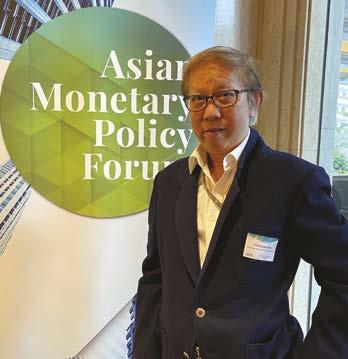
AIA signs open letter urging UK government to take climate action
In collaboration with the world’s leading accountancy and finance bodies, AIA urges the UK government to take transformative action to achieve the global Sustainable Development Goals by 2030.
AIA’s Chief Executive Philip Turnbull signed an open letter to the Prime Minister alongside 10 other professional bodies, including ICAEW, Institute and Faculty of Actuaries, Chartered Banker Institute, London Institute of Banking and Finance, Association of Corporate
Treasurers, Chartered Insurance Institute, CFA Society of the UK, Chartered Institute for Securities and Investment (CISI), ICAS and CIPFA.
The letter stresses that we are halfway to the 2030 deadline to hit the UN Sustainable Development Goals, yet the world is only on track to meet 12% of its targets. Time is running out!
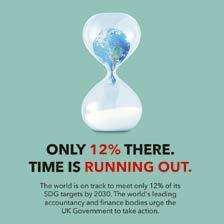
‘The science shows us that not only are we failing to collectively tackle the climate and nature crises, but inequalities are also growing at an alarming rate.
the Monetary Authority of Singapore. These events provided a platform for Mr Chow to emphasise AIA’s unwavering commitment to ethical corporate practices and responsible governance.
AIA’senduringimpact
Albert Einstein once said, ‘How earnestly I must exert myself in order to give in return as much as I have received.’ Mr Michael Chow’s active participation and representation of AIA in various prestigious events and conferences in Singapore exemplify this sentiment. AIA’s dedication to sustainability, social responsibility and ethical practices is not just a corporate slogan; it is a lived reality, championed by individuals like Mr Chow who was previously a Board Director of United Nations Association of Singapore. Through these initiatives, AIA continues to play a pivotal role in promoting a more responsible and ethical corporate community in Singapore and beyond.
This isn’t just a crisis of people and planet, it’s a crisis of our economies and global financial system.’
Read the open letter at: tinyurl.com/bddmz496.
Note: This was written before the recent announcements about changes to the government’s policy on Net Zero.
5 AIAWORLDWIDE.COM | ISSUE131 AIA NEWS COMMUNITYCHAMPION
Michael Chow at the Asia Monetary Policy Forum
AIA’s sustainability commitments
AIA advocates prioritising IFRS S1 and S2 in Sustainability Standards.

In response to the International Sustainability Standards Board’s (ISSB) request for input on its agenda priorities, AIA underscores the critical importance of prioritising the implementation of IFRS S1 (General Requirements for Disclosure of Sustainability-related Financial Information) and IFRS S2 (Climate-related Disclosures). AIA strongly supports the development of high-quality global standards for sustainability-

agenda consultation, particularly concerning the development of future standards, including S3.
AIA believes in creating a global accountancy profession and supports the International Federation of Accountants (IFAC) in creating a global accountancy profession recognised as a valued leader in the development of strong and sustainable organisations, financial markets and economies. AIA has adopted IFAC’s Code of Ethics
6 ISSUE131 | AIAWORLDWIDE.COM SUSTAINABILITY
©Getty images/iStockphoto
for professional accountants and incorporates IFAC’s International Education Standards (IES) into qualifications.

AIA Director of Operations David Potts said, ‘Universal adoption of S1 and S2 is vital for the ISSB’s future goals. These standards lay the foundation for a robust global sustainability reporting system, crucial for navigating sustainable finance and responsible business practices. Prioritising their broad adoption is key to realising the ISSB’s ambitions and ensuring sustainability.’
AIA’scommitments
The views expressed in this consultation response build upon AIA’s role as a membership and qualifying body, supporting members to provide critical data to their clients and preparing accountants of the future for their key role in sustainability reporting. The response highlights not only some overarching comments for consideration but also detailed responses to the specific questions posed by the ISSB, with particular focus on the importance of SMPs and SMEs in this sustainability-reporting space.
AIA is actively involved in educating its members about green finance through a series of workshops designed to prepare them for a low carbon and net zero future.

These workshops cover critical topics such as climate change, social inequalities, carbon footprints and sustainability accounting standards, emphasising the vital role accountants play in addressing these global challenges. AIA is also extending open access to these workshops, highlighting the importance of green finance education.
In summary, AIA advocates a strong focus on IFRS S1 and S2 as the foundation for the ISSB’s sustainability standards agenda. AIA underscores the importance of broad adoption of these standards, while emphasising collaboration, efficient use of existing work and strategic planning as key components in the ISSB’s path forward. ●
IFRSS1andS2:Asummary
IFRS S1 (General Requirements for Disclosure of Sustainabilityrelated Financial Information): IFRS S1 is effective for annual reporting periods beginning on or after 1 January 2024 with earlier application permitted as long as IFRS S2 Climate-related Disclosures is also applied.
The objective of IFRS S1 is to require an entity to disclose information about its sustainability-related risks and opportunities that is useful to users of general purpose financial reports in making decisions relating to providing resources to the entity.
IFRS S1 requires an entity to disclose information about all sustainability-related risks and opportunities that could reasonably be expected to affect the entity’s cash flows, its access to finance or cost of capital over the short, medium or long term (collectively referred to as ‘sustainability-related risks and opportunities that could reasonably be expected to affect the entity’s prospects’).
IFRS S1 prescribes how an entity prepares and reports its sustainability-related financial disclosures. It sets out general requirements for the content and presentation of those disclosures so that the information disclosed is useful to users in making decisions relating to providing resources to the entity.
IFRS S2 (Climate-related Disclosures): FRS S2 is effective for annual reporting periods beginning on or after 1 January 2024 with earlier application permitted as long as IFRS S1 General Requirements for Disclosure of Sustainability-related Financial Information is also applied.
The objective of IFRS S2 is to require an entity to disclose information about its climate-related risks and opportunities that is useful to users of general purpose financial reports in making decisions relating to providing resources to the entity.
IFRS S2 requires an entity to disclose information about climaterelated risks and opportunities that could reasonably be expected to affect the entity’s cash flows, its access to finance or cost of capital over the short, medium or long term (collectively referred to as ‘climate-related risks and opportunities that could reasonably be expected to affect the entity’s prospects’).
IFRS S2 sets out the requirements for disclosing information about an entity’s climate-related risks and opportunities.
7 AIAWORLDWIDE.COM | ISSUE131 SUSTAINABILITY
Achieving success with EPP
How to tackle the moral challenges of the ethics and professional practice exam.
Ethics and professional practice (EPP) can sometimes be seen as a more challenging exam – but with the right approach, there is nothing to stop you succeeding. This short article talks you through how to achieve success in the EPP exam.
Preparing
The old adage that ‘failing to prepare is preparing to fail’ holds especially true for EPP, partly given the fact that the exam is only one day and represents the culmination of your studies. A proper approach to studying and practice should ensure that you are fully ready to attempt the exam. An athlete would not attempt a sporting event without proper training, and similarly you should not attempt the exam without proper preparation.
Ensure that you have fully worked through the EPP coursebook and the exercises included, focusing particularly on ensuring that you have an understanding of the primary ethical theories used within the course, such as absolutism or cognitivism. It is a good idea to practise writing these out in your own words so that this approach has become second nature by the day of the exam.
As well as ethical theories, the course relies heavily on the codes and regulations applicable to professional accountants, and you should also be able to understand these requirements and explain them in your own words. You will see from the past papers that there are a large number of questions which rely on either the ethical theories or the professional codes; therefore, being able to write about these is a vital skill for passing the exam.
The coursebook also contains excellent exam examples and practice questions. When working through the coursebook, you should practise these questions in full. However, take care when reviewing your answers: it might be easy to think that you would have come to the right conclusion when you read the solution, but you should focus on the aspects of the answer that you didn’t pick up on or fully attempt.
One of the big issues in EPP is appreciating that every scenario is different and will have different
parties and individuals impacted – we call these stakeholders. Therefore, as you are working through your practice questions, take time to identify who the stakeholders in the example in question are likely to be – in other words, who is going to be impacted by your decision? For example, it is likely that customers are a key stakeholder in any business, but if you were presented with a scenario in which a company was closing down a factory and you wrote extensively about customers rather than employees, it is unlikely that you would receive a good mark. It does not mean that customers would not be affected by the company’s decision – only that they are unlikely to be a group which is particularly impacted by it.
Similarly, when practising your questions, take time to identify who you are in the scenario and your role within the organisation. This has a big impact upon the correct response: for example, your response to an ethical issue within an audit firm will differ significantly according to your role within the firm. While a more junior member of staff would simply be expected to report this issue to someone more senior, an audit partner would be expected to take direct action themselves to resolve the situation.
The ability to recognise that each scenario is different and devise an appropriate response is therefore one of the most vital skills you need to develop for EPP. After all, every scenario you will encounter in real life will also be different.
As you approach the exam, you should be focusing heavily on attempting past papers. These give you the opportunity to practise in a format as
8 ISSUE131 | AIAWORLDWIDE.COM STUDENTS
©Getty images/iStockphoto
close to the exam as possible. As some students can feel the pressure of time during the exam, it is strongly recommended that you try the past papers under timerestricted conditions so that you are best prepared for any time pressures you may feel on the day.
Startingtheexam
It is vital to ensure you understand the scenario in question, so you should first spend time reading through the information in its entirety. These scenarios are written very specifically so every part of the scenario is very important, and nothing is coincidental. You should then take time to read the questions carefully – a common mistake made by students is to answer the question they would have liked to have answered rather than the question asked, so spend some time making sure you understand what is being asked.
Writingyouranswer
Once you have read through the question fully, you are able to start writing your answer to the question. The two most common mistakes made by students are to:
1. Write very general answers: Instead, answers need to be tailored to the specific scenario in the question. Very general answers about, for example, corporate governance will receive very few marks.
2. Keep their answers too short: Answers need to fully develop a response to the question asked. You will not be able to develop a full answer to a complex question very briefly. For example, a 10 mark question will need a considerable amount of development – it is not possible to answer a complex question like this in a few lines.
It sometimes appears as if students can be nervous about giving an opinion on the question, but it is important to realise that a fundamental part of the course involves your willingness to share your views on the scenario and the elements within the scenario. This naturally involves discussing issues and giving your own opinion. If you restrict your answer to simply repeating factual matters from the casebook rather than sharing your opinion or developing facts, you will receive a low mark and will not be able to pass.
Approach
One of the critical things you should do in attempting your AIA paper is to plan timing. You will have four questions to do, each with equal weighting (25 marks each). There is no point in focusing on just one question: regardless of how well you perform in this question, you will be unable to pass the paper with just 25 marks. It is therefore vital that you adequately plan your approach to the paper to allow you sufficient time to properly attempt all questions – a reasonable answer to all four questions is far more likely to lead to a pass than a good answer to one question and a poor answer to the other three.
As the entire paper is three hours, expect to spend around 45 minutes – including reading time – per question, as a rough guide. Spending significantly longer than that on an individual question will mean that you are unlikely to be able to answer the later questions fully.
Examplequestion:thescenario
As an example for the purposes of this article, we are going to look at question 1 from the November 2022 paper. The scenario involves you working for a UK-based energy company that has traditionally supported the provision of good-value energy to those on lower incomes and has been developing a green energy agenda. It currently has a number of long-term projects in place to develop tidal and wind power, which will provide cheap green energy.
At the time when the scenario is set, however, an increase in global energy prices has meant that many of the company’s long-term contracts have become unprofitable. The company has been put in a position in which it may be required (against the wishes of the CEO, who holds a very progressive agenda) to end some of the contracts and deals which they offer to their poorest customers.
However, another option would allow the company to enter into an agreement to extract gas in the small country of Costa Luna at a very favourable price. This deal would allow the company to continue to support their least well-off customers, while allowing for the development of these longer-term green energy products. It would, however, lead to widespread environmental destruction in Costa Luna and the displacement of indigenous people. One of the board members, Helen Xu, is extremely against this proposal, stating: ‘The destruction of the natural environment in the pursuit of corporate interests is always wrong.’
Let’s have a look at the requirements:
RequirementA
a. Develop Helen Xu’s general statement that ‘the destruction of the natural environment in the pursuit of corporate interests is always wrong’
from:
i. a cognitivist perspective [4 marks]; and
ii. a teleological (consequential) point of view [6 marks]
This requirement is essentially asking you to consider a fundamental question: is a statement correct? To fully answer this question, we need to not only understand the underlying ethical theories but also apply them to the particular scenario.
A cognitivist viewpoint divides the world clearly into right or wrong. To get good marks, however, it is important that you do not simply state what the theory means, but instead how it applies to the scenario.
A good answer would therefore state that Helen’s belief that ‘the destruction of the natural environment
9 AIAWORLDWIDE.COM | ISSUE131 STUDENTS
is always wrong’ means that this action is clearly wrong, and the company should not carry it out. Remember that it is vital that you show how this idea relates to this scenario and the statement by Helen: simply stating what a cognitivist viewpoint is in general will not get many marks.
A teleological, or consequentialist, viewpoint works on the basis of considering an action in the context of its wider impact. In other words, there are no actions that are simply deemed right or wrong. This perspective is more about considering the broader impact of the decision and outcome on the various stakeholder groups.
Simply stating a definition of the ethical theory would not be enough. A good answer requires the student to consider that an action that appears to be bad could be justified if it leads to an overall good outcome. A good answer to this question would therefore accept that the destruction of the rainforest in this scenario could be a bad action but could still be justified by the positive broader outcomes.
RequirementB
b. Assuming that Martin’s financial projections are valid, evaluate Martin’s justification of the project from a teleological (consequential) perspective. Ensure that your analysis encompasses an appropriate range of stakeholders, stating any issues with the approach. [8 marks]
This is quite a big requirement for 8 marks: let’s take a closer look. Martin is the CEO of the company, and we are being asked about his plan to deal with the gas extraction in Costa Luna in order to fund the continued green development and cheaper fuel prices for those who are less well off.
The wording here is very important, so let’s consider it in detail. The first part asks us to assume that Martin’s projections are correct. In other words, this is not a question of assessing the technical accuracy of Martin’s ideas, but rather whether they are morally correct. Some students spent time discussing the technical accuracy of these projections and the process of preparing projections, but this was very specifically not what the question asked for and received no marks.
An 8 mark question will require a considerable level of discussion. It is therefore vital that you take time to fully elaborate and write out a complete answer here. A few lines or bullet points will not suffice. The question asks you to consider this from a teleological or consequentialist point of view – in other words, considering the idea that the end results of this decision justify the decision being made. In this scenario, therefore, you would have to discuss the idea that carrying out this destructive gas exploration in Costa Luna is in fact justified due to the fact that it will protect lower-earning customers and allow for the development of green energy solutions. In other
words, the short-term losses and destruction of this project are justified by the fact that it will lead to a better long-term outcome.
Finally, the question asks us to consider the issues with this approach. While consequentialist ethics is certainly a valid way of assessing a situation, it has a major flaw in that it does not consider the rights of the individual. For example, if you are one of the indigenous people who is likely to be made homeless by this development, the understanding that it is for the greater good is likely to be of limited comfort.
A good answer will consider the broader issues around who benefits from a particular decision and the various benefits and rights of each of the parties. Some students wrote about the legal implications of this scenario – but, as the scenario made very clear, this project had been approved by the government of Costa Luna, so the legal implications were not an issue and should not have been extensively discussed.
RequirementC
The final requirement took the scenario in a slightly different direction. In this part, you were approached by a contact called John, now working as a financial journalist. John had heard rumours of the financial pressures facing the company and wanted information from you about these. John said that he would not name you in the reports.
c. With reference to the IESBA fundamental principles, critically appraise John’s suggestions that you should pass these documents to him as it is in the public interest. [7 marks]
A common mistake made by students was to list the IESBA requirements. While knowing these is a vital part of answering the question, the fundamental requirement is that you are able to illustrate how they apply to the scenario concerned. In this case, the key factor is the principle of confidentiality, so it would not ordinarily be permissible to release information about a company that you had obtained through your employment. This would be a fundamental breach of your duty as a professional accountant.
Although there is an exception for whistleblowing, it is simply not possible for the accountant to release this themselves. Material can only be released if the company has broken the law, and only after the accountant has made attempts to resolve or deal with this internally. In this case, there is no evidence that the law has been broken, let alone that any attempt to resolve this has been made. This means there is no justification for whistleblowing: something being of interest to the public does not mean it is in the public interest.
Hopefully, you now have a better appreciation of the key techniques required for success in EPP. Remember that a full answer that deals with the scenario in question is vital. ●
10 ISSUE131 | AIAWORLDWIDE.COM STUDENTS
Develop your career
Continuingprofessionaldevelopmenthelps toaugmentandenhanceyourabilitiesinthe workplace,makinglearningaconsciousand proactiveactivity.
There are a variety of different methodologies involved in continuing professional development (CPD), such as workshops, conferences, online courses and e-learning. It offers you the opportunity for upskilling regardless of where you are in your career, your age or even your level of education.
Howdoesitbenefitme?
It could help you to keep your skills and knowledge up to date; prepare you for greater responsibilities; boost your confidence; help you to become more creative in tackling new challenges; enable you to make better decisions; and help you to take your career further.
In an ever-changing world, CPD enables you to adapt to changes in the work environment and you can quickly and easily build the skill sets required by your organisation. Since 2020, when working from home became the norm, the use of technology has had to be embraced. Keeping up to date with these changes is vital.
Keepyourinterestinyourprofession
Everyone has ‘one of those days’ when they feel that they are ready to throw in the towel. However, CPD can open you to new skill areas and refresh your knowledge, encouraging you to stay engaged and remember why you chose the profession you did. This will in turn help you to become more effective in your career.
It is your responsibility to look after your career development and to use your judgement to make decisions on the relevance of your CPD activities. There are three important points to consider when planning CPD:
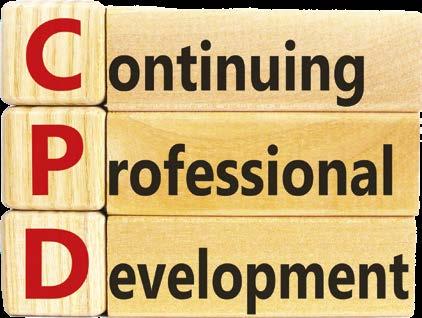
● What do you want to achieve?
● What do you need to learn?
● How will you learn it?
You may already be working through your development needs on a regular basis. Remember that if you have a plan in place at the start of the
subscription period, you can tweak it as the year progresses to cover new topics relevant to your role or of interest to you.
Whatever your approach, the following tools may assist you to identify learning and development needs and how to address those needs.
Personal Development Plan: You should formulate a Personal Development Plan (PDP) to help you plan your CPD and select activities which are relevant to your role and responsibilities. When compiling this, you are encouraged to review your current skills and competencies so you can then source relevant learning activities to help develop these. For more information about a Personal Development Plan, please refer to the AIA CPD Guidelines at: www.aiaworldwide.com/media/1555/ cpd-guidelines.pdf
Competency map: A competency map can assist in identifying training and development needs before identifying learning activities. It is essentially a list of competencies that are needed to perform your role and responsibilities effectively. There are three types of competencies: knowledge, skills and attributes. Your competency map should include ratings of the relevant importance of each competency and an indication of whether each is mandatory, essential or desirable.
Learning CPD: There is much competition in the CPD market. As outlined above, the type of learning can vary, so you will need to consider what will help you achieve your goals for the year. You should set a timeframe in line with your AIA subscription period – i.e. 1 October to 30 September – and set realistic targets for each month. Try to schedule these around your work commitments and keep an eye on your progress. You certainly do not want to leave all your CPD until the last couple of months.
Take time to reflect on what you have learnt and how you are using this within your role, but also identify any further development requirements. And finally, do not see CPD as a ‘tick-box’ exercise but as something of value. ●
11 AIAWORLDWIDE.COM | ISSUE131 CPD
©Getty
images/iStockphoto
A mindset shift: think better
Lucy Cohen examines how a mindset shift can help accountants to overcome their limitations and transform their career.
In the world of accounting, precision and accuracy are paramount. As accountants, we are trained to abide by strict rules and regulations, ensuring that every figure is spot-on. But this laser focus on the technical aspects can sometimes overshadow the importance of mindset.
As an accountant, your mindset can be the invisible force either propelling you forward or holding you back. It’s high time to ask yourself –are you getting in your own way?
This article is my call to action for accountants to assess, reset and adopt a growth-oriented mindset that can break down barriers and usher in a new era of progress and success. In my own life, I have found that the periods where I have
achieved my greatest successes have been when I have adopted a growth and abundance mindset, and have worked very hard to overcome things like doubt and imposter syndrome to get out of my own way!
Precision is not just in numbers; it’s also in mindset. In our rigorous accounting universe, where every decimal counts, it’s easy to forget that our mindset counts just as much. So how will your mindset influence your success?

Isyourmindsetyourownworstenemy?
As accountants, we are champions of precision and protocols, the guardians of fiscal truth! Frankly, I’m astounded that Marvel hasn’t included one of us in their superhero franchise yet – after

12 ISSUE131 | AIAWORLDWIDE.COM PERSONAL DEVELOPMENT
LucyCohen Co-Founder,Mazuma
all, they’ve got the theoretical physicist Robert Bruce Banner! But we are sometimes the underwriters of our own limitations.
Let’s rip the off the plaster and confront the hard question: are you obstructing your own path to success? Or, to put it another way, are you getting in your own way? The accounting industry is evolving and so should our mindset. We have to start thinking of ourselves outside of the pigeonhole of accountancy, and start working to see our value in the context of wider business.
Let’s start with some food for thought. For those of you that run your own firms, perhaps it’s time to stop calling what you do an ‘Accountancy Practice’, and start thinking of it as an ‘Accountancy Business’ instead.

PERSONAL DEVELOPMENT
Thefixedmindset:theaccountant’ssilent adversary
Named by psychologist Carol Dweck, a fixed mindset is akin to believing that your skills are immovable constants. Do you think that you’re ‘just a numbers person’ or that managerial roles aren’t for you? These are self-erected walls, not realities. And it’s exactly these sorts of beliefs that will stifle your growth.
Our field is ever-changing: evolving regulations, emerging software and fluctuating client expectations. A fixed mindset? That’s the fast track to stagnation and stress. To break free, challenge these beliefs. Ask yourself, ‘Why not me?’ Start to see change as an opportunity, rather than a threat. Embrace lifelong learning, and understand that your value as an accountant goes way beyond your technical ability.
Thetransformativepowerofagrowth mindset
On the other end of the spectrum, the growth mindset is your key to boundless potential. Here, challenges transform into stepping stones, not roadblocks.
Errors become lessons, not failures. With a growth mindset in your toolkit, you’re not just an accountant but a resilient, agile, ever-improving professional who is capable of building the business of your dreams, whatever that happens to look like.
A growth-oriented accountant is poised to:
● navigate and master new technologies and methodologies;

● hone leadership and communication prowess;
● commit to perpetual improvement and professional evolution; and
● nurture enriching relationships with clients and peers.
There are examples of a growth mindset allowing people to get out of their own way all around us, but let’s take a really famous one…
Richard Branson stands as a beacon for breaking free from self-imposed limitations and soaring to stratospheric success (pun entirely intended!). Here’s a man who, despite struggling with dyslexia in his early years, never confined himself to societal labels.
Rejecting the notion that he was ‘unfit’ for business due to his learning difficulties, Branson trusted his vision and innate sense of adventure. With only a high school education and a pocket full of dreams, he launched Virgin Records out of a church basement. From there, he built the Virgin empire, which now spans across industries from music to airlines to space travel.
Richard Branson’s story is a masterclass in getting out of your own way – he didn’t let his
13 AIAWORLDWIDE.COM | ISSUE131
©Getty images/iStockphoto
Theaccountant’sblueprinttoagrowthmindset
● Self-audit: Start with an introspective balance sheet. Identify and document the restrictive beliefs anchoring you down.
● Challenge the norm: When ‘I can’t’ thoughts arise, reframe them: ‘I haven’t yet, but I’m learning how.’ Words wield power; use them wisely!
● SMART goal setting: Specific, Measurable, Achievable, Relevant, Time-bound objectives are your compass. Review and recalibrate as your journey progresses.
● Embrace feedback as growth fuel: Recondition your mind to see feedback as constructive criticism, not personal affronts or mere praise.
● Lifelong learning investment: Webinars, courses, industry reads, networking – make learning your constant companion.
● Practise self-kindness: Extend the patience and empathy that you offer to friends to yourself.
● Visualise the win: Envision your life after making your desired changes. Use this vibrant image as your North Star.
past, his failures or his critics pen his future. Instead, he chose to author his own extraordinary narrative, with bold strokes of ambition, resilience and relentless innovation. He’s a reminder that when we move beyond our self-doubt and dare to dream audaciously, we can all write our own success stories.
So what does Branson have in common with us as accountants? You may say very little, especially given that he’s admitted that it took him until his fifties to understand the difference between net and gross profit! But what we can learn from him is that even if we can’t master a skill ourselves, a growth mindset lets us bring in other people to handle those things for us.
If you want to run a successful accountancy business, you cannot handle everything yourself. However, especially for those of us who have bootstrapped our way to growth, the tendency to want to keep control of everything (including the purse strings) can mean that we end up limiting our success. Our fear of not having enough work leads us to make the wrong decisions about clients, and so we get in our own way with a scarcity mindset, rather than an abundance mindset.
Abundancevsscarcitymindsets
Let’s look at an example of the difference between an abundance mindset and a scarcity mindset. An abundance mindset refers to the belief that there is plenty for everyone. It’s the philosophy that the world is full of opportunities waiting to be seized, and that success, wealth and happiness are not finite resources. Individuals with an abundance mindset tend to be optimistic, confident and open to new experiences, believing that they are one step closer to success, even when they lose.
In stark contrast, a scarcity mindset operates on the principle of ‘never enough.’ It views life as a zero-sum game where the gain of one person necessitates the loss of another. People with a scarcity mindset often feel anxious and threatened by the success of others, believing that there is a limited amount of resources, opportunities or success to go around. They tend to be highly competitive and fear-based, reluctant to share knowledge or resources with others.
In essence, while an abundance mindset focuses on possibilities and growth, a scarcity mindset is rooted in limitations and fear of loss.
In our accountancy businesses, a scarcity mindset might look like taking on the wrong sort of client, because we’re scared that if we don’t take them on, they’ll go elsewhere. Or it can look like cutting marketing or personal development spend when times get tight, instead of focusing on making sales rather than cutting costs.
A scarcity mindset works to allay short-term fear, but it’s not an effective long-term strategy. Yes, in the short term, cutting costs or taking in the income from any old client might seem like it solves a problem. But it’s actually a short-term strategy that will adversely affect your long-term goals. The wrong client on the books takes the space away from a much higher-paying client later on. And cutting spending on marketing means your pipeline dries up!
So how do we start fostering a growth and abundance mindset? We follow the blueprint for success set out in the box above.
Yourcareer,supercharged
When you dismantle the roadblocks that your mindset might be placing in your way, the transformation can be dramatic for both your business and for you personally.
With a growth mindset, anticipate being able to:
● emerge as your team’s solver of complex puzzles;
● amplify your market value and demand;
● forge deep, trust-filled client relationships; and

● revel in heightened job satisfaction and mental wellbeing.
You are not ‘just’ an accountant. You are an evolving, nimble and invaluable professional in a dynamic landscape, continually refining your craft and character. Now, go on – crunch those numbers and crush those limiting beliefs! ●
For more information, visit the ProNation website at https://jointhenation.co.uk
14 ISSUE131 | AIAWORLDWIDE.COM PERSONAL DEVELOPMENT
Author bio LucyCohenisthe Co-FounderofMazumaand amentorforProNation,a communityofambitious accountants.
The importance of upskilling in accountancy
Shaun Barton looks at what the future holds for the role of the accountant and how upskilling can help us navigate this lifelong journey.
Accountancy is an ever moving and ever changing industry.
From the introduction of new technology, through to amendments and updates to regulations, what it means to be an accountant is continually shifting. As the nature of the role changes, so do the skills required to achieve continued success. Ensuring that your skills as an accountant – or those of your employees – are up to date can be done through a process known as upskilling.
Unlike reskilling, which involves learning a whole new set of skills to perform an entirely new role, upskilling refers to honing and developing your existing skill set related to your current role. Upskilling can be seen as an
intentional process of continuous learning, which provides a number of benefits to both employees and employers alike.
Within the world of accountancy, upskilling can equip accountants with the necessary skills to perform optimally in an increasingly digitised world, boosting their confidence and adding value in the process. In addition, an upskilled employee provides their employer with the opportunity to deliver a more comprehensive offering and better service to their clients and to remain ahead of their competitors.
Howisupskillingachieved?
From an employer’s point of view, upskilling is accomplished by first identifying the skills most important to your organisation. Examine the
15 AIAWORLDWIDE.COM | ISSUE131 PROFESSIONAL SKILLS
ShaunBarton Partner,RealBusiness Rescue
©Getty images/iStockphoto
gap between the skills you want your employees to have and those they currently have – and then work to bridge these gaps by improving knowledge and updating proficiency.
Upskilling is not a one-size-fits-all operation. It can be achieved in a variety of ways, through formal education and training programmes; learning from colleagues through shadowing and secondment opportunities; and attending workshops, webinars and conferences.
Upskilling helps from a compliance perspective, as well as ensuring that you remain relevant and competitive within your role or industry when it comes to the services you can offer clients. It is more than just about keeping up with industry changes, however. Upskilling equips you with the tools you need to use the new environment to your benefit, helping to drive real growth and add value.
If you want to put yourself in the best possible position for career growth, it’s time to seriously consider upskilling.
Accountancy:achangingindustry
While upskilling is a deliberate process, there are some instances where you may have no choice but to ensure that your skills and knowledge are updated. Digital and technological advancements are changing the landscape of accounting at an unstoppable pace, and there is a real risk that those accountants who fail to adapt will get left behind. Building the skills necessary to manage and embrace this new technology in an increasingly digitised world will help you to increase efficiency and accuracy, ensuring that you are keeping up with your peers.
Digitalenhancementswithinaccountancy
The speed of digitisation within accountancy has been rapid, and much automation and recently developed technology is now becoming commonplace within an accountant’s day to day working life. Application programming interfaces (APIs), automation and the continuing development of artificial intelligence are having a huge impact on many elements of the job that have traditionally been done manually.
These advances now make it possible for data to be extracted and shared easily and effectively using APIs. Artificial intelligence is able to process huge amounts of data accurately and almost instantly – in many cases negating the need for a human to complete the time-consuming, manual work that used to be a central part of an accountant’s role.
It is almost guaranteed that accountancy will become more and more automated over time. You will put yourself in a better position if you stop seeing these advancements as a threat, and start to embrace them by leveraging them to your
advantage. See upskilling not only for the immediate improvements it can realise, but as a way of futureproofing your career for the long-term.
Thechangingroleoftheaccountant
The time savings brought about by increased digitisation frees up valuable resources which can be directed towards strengthening client relations and providing clients with strategic advice.
The accountant of the future will require a diverse skill set, going beyond being ‘good with numbers’. Being able to offer compelling insights, robust advice and act as a strategic partner will be increasingly seen as the primary function of an accountant, as automation relieves many of the manual elements of the role.
Theimportanceofbothhardandsoftskills
When it comes to identifying areas ripe for upskilling, you should not limit yourself to merely the technical skills you need to succeed in your role. Particularly as automation continues to step in to complete the more routine manual accountancy tasks, it’s important to ensure that your ‘soft’ skills are honed, as well as your ‘hard’ operational skills.
This could involve improving your ability to communicate effectively with clients by refining your communication skills and your ability to deliver strategic advice in a clear and concise manner. Being adept at critical thinking, time management and problem solving is becoming just as important as being able to interpret the data in front of you.
As these soft skills become more essential, ensuring that you are a well-rounded employer will ultimately allow you to add more value to the firm, as well as giving you an edge over your contemporaries, who may neglect these areas during their own upskilling journeys.
Boostingretentionandenhancingcareer development
Upskilling is not just something that employees need to think about; it is just as important for employers to understand the benefits that upskilling their staff brings. Continued directed learning stops complacency from setting in and keep employees excited about their roles. This in turn increases productivity and creates the perfect environment for growth both for the individual and also the organisation as a whole.
The changes brought about by widespread remote working over the past few years means that competition for talented accountants has increased. No longer restricted by geographical constraints, the world has opened up to those seeking more challenging opportunities who would have otherwise been out of reach when office attendance was mandatory.
16 ISSUE131 | AIAWORLDWIDE.COM
PROFESSIONAL SKILLS
Askillsgapanalysisidentifiesgaps;upskillinghelpstobridge thesegaps.
If you are an employer looking to upskill your workforce, you will need to identify ambitious staff who you believe would be suitable to step up and who would both benefit from, and appreciate, the opportunity to boost their current skill sets. Involve your team in this process; after all, they are likely to have an idea of the type of training they would like based on their own career objectives. One-to-one meetings can help you develop personal development plans for employees across the business, which can act as the basis for both immediate and future upskilling endeavours.
Upskilling:alifelongjourney
Remember, upskilling should be seen as a continuous process rather than a one-off event. Accountancy isn’t standing still, and neither should you! Upskilling is a lifelong journey and something which needs to be revisited multiple times across your career to ensure resilience and adaptability –no matter what the future looks like for accountants.
Offering upskilling opportunities is an extremely useful, yet underutilised, tool in the armoury for smaller firms, in particular when looking to retain staff and stop them heading for the door.
Making further training and upskilling opportunities available to staff is a great way of rewarding ambitious employees who are keen to grow and develop in their role. Not only does this help with the retention of key employees, but also increases their contribution and the value they add to the firm.

Allocating resources to upskilling should be viewed as a vital use of budget – one which can reap a variety of rewards. Investing in your people is one of the best ways of investing in your business as a whole. A better trained and more knowledgeable workforce makes for a company better placed to seize growth and expansion opportunities.
Addressingtheskillsgap
If you are sold on the benefits of upskilling, the next step is to put together a plan to bring this to life. It sounds obvious, but the first step towards embarking on an upskilling programme is to have a sound understanding of the areas where your organisation – or you as an individual – actually need upskilling. This is done through a process known as a skills gap analysis.
A skills gap analysis helps to highlight the discrepancy between the skills an employer wants an employee to have, and the skills the employee actually has. Don’t just focus on the short term during a skills gap analysis. Identify possible areas for growth or change in your firm and also the wider accountancy industry, and assess how sufficient your current skills are for getting you to where you need to be. Once you have identified the skills you need to brush up on, the upskilling process can begin in earnest. ●
17 AIAWORLDWIDE.COM | ISSUE131 PROFESSIONAL SKILLS
©Getty images/iStockphoto
Author bio ShaunBartonisapartner atRealBusinessRescue, specialisinginproviding insolvencyadviceto directorsofdistressed companies.
Rememberthatwithchange comesopportunity.Don’tbe afraidofwhatautomationcan do–instead,getexcitedabout howitcouldprovideaboostto yourcareergoals.
The reality of our failings
With an estimated 130,000 people trapped in slavery in the UK, Richard Simms asks whether we are all complicit when it comes to money laundering.

18 ISSUE131 | AIAWORLDWIDE.COM ANTI-MONEY LAUNDERING
RichardSimms Managingdirector,FASimms&Partners
© Getty images/iStockphoto
The UK has £87.9 billion (amounting to 4.3% of our GDP) laundered through its economy every year (see tinyurl.com/373j9n7z). This makes us second only to the US in the amount of criminal funds that pass through our country.
This cannot go on. But currently the UK is losing in the global fight against money laundering. The Transparency International Corruption Perceptions Index ranks the UK in 18th place (see tinyurl.com/4n8e42rn) – an embarrassing four places below Uruguay, a country with a reputation for suppressing freedom of speech, sitting in 44th place for freedom of expression in the rankings of Reporters Without Borders (see rsf.org).
The accountancy sector, as with all our other regulated sectors, is a gatekeeper of our country’s economy. Clearly, that role is not being performed nearly well enough.
Ahypotheticallookattherealityof potentialanti-moneylaunderingfailings
Modern Slavery estimates that over 130,000 people in the UK are trapped in slavery (see tinyurl.com/5n8a4xhe). As well as criminal industries, these people are in licit sectors like construction, shops, bars, car washes and manufacturing.
If you are completing the right anti-money laundering (AML) checks on your clients, their involvement in this criminal activity might present anomalies. But according to the annual reports from various accountancy supervisors, it appears that only around 15% of accountants are currently doing everything they can to comply with the regulations and taking the matter seriously. Unbelievably, an estimated 15% are still doing nothing at all. The remaining 70% may be carrying out some of the necessary steps and work to be fully compliant but are still not doing everything they should be.
Imagine that one day you get a call or visit from law enforcement. Some of the workers on your client’s construction site have been referred to the authorities as suspected victims of modern slavery. What happens next depends on whether you have fulfilled your AML obligations.
If you are one of the 15% of firms that does everything it can to comply, you’ll have completed all the required AML steps and have a complete audit trail to prove it. If there were no red flags, or if you can show how you mitigated the risks that you did spot, you can hand over the information you have on the client with the peace of mind that you did everything in your power to identify criminal activity.
For the other 85%, the matter is much more serious. Under the current laws, your firm could be fined tens of thousands of pounds and lose its licence to continue in business. However, the
Economic Crime and Corporate Transparency Bill, which is going through its final amendments now, proposes that the ‘failure to prevent’ clause makes any business responsible for preventing money laundering. Should this amendment pass, ‘failure to prevent’, which is what you could potentially have done by not fulfilling your AML obligations, brings with it the likely possibility of criminal charges too.
Then you have the ethical issues. I would imagine that any potential involvement in modern slavery, albeit unwittingly, would not sit well with you.
Compliancecanbeeasy
As a regulated professional in the accountancy sector and as an AML expert, I have seen the challenges that firms have with compliance. UK professionals have got to stop seeing AML risk management and compliance as a nuisance and a waste of their time – there is a much bigger picture. It may seem onerous unless you fully understand what AML really is and why it exists. When you are facing the possibility of your AML processes being put under the spotlight, that may the first time that you analyse what you’re doing and realise that it’s not up to scratch. Often, nowhere near up to scratch. The Regulations clearly define the AML obligations that all firms are legally required to comply with. To give you an overview:

● Have you appointed appropriate people in your firm’s AML roles?
● Have you trained all employees, agents and senior management on how to recognise money laundering, terrorist financing and proliferation financing, as well as on their legal AML obligations and how to fulfil them?
● Have you carried out a business-wide risk assessment analysing all the potential risks that your business faces and your clients present?
● Are your AML policies, controls and procedures (PCPs) shaped by your business-wide risk assessment so that you can correctly adopt the risk based approach?
● Have you completed the correct client due diligence on every client, including a comprehensive client risk assessment?
● Do you have a complete date stamped audit trail which proves your compliance at any time?
Once you have the right processes in place, AML is much easier to keep up with – more like regular housekeeping rather than a once-a-year spring clean. It will also allow you to minimise the risk of yourself and your firm suffering the severe legal and ethical consequences of becoming unknowingly involved in criminal activities.
If all regulated professionals pull together to fight money laundering worldwide, it will start to work. If you’re not going to properly comply with AML regulations, you are in the wrong industry. ●
Author bio RichardSimms
managingdirector
&
19 AIAWORLDWIDE.COM | ISSUE131 ANTI-MONEY LAUNDERING
isthe
ofFA Simms
Partners.Muchof histimeisspentadvising clientswithregardsto financialproblemresolution.
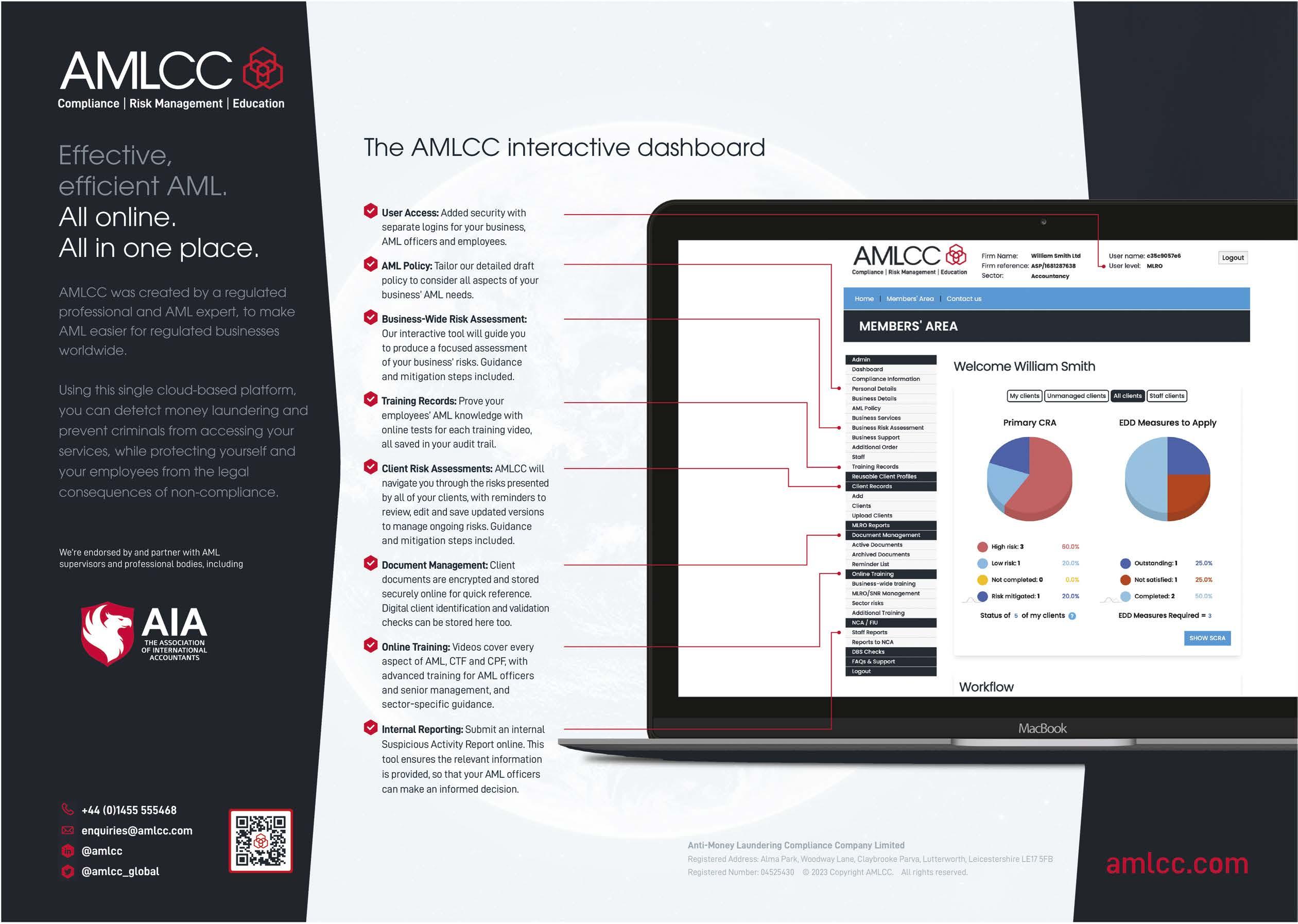

Accounting for ‘Scope 3’ carbon emissions
With climate change a growing concern worldwide, all businesses are under increasing pressure to reduce their greenhouse gas emissions. However, the majority of companies overlook their greatest source of emissions – those that go by the name of ‘Scope 3’.
As trusted advisors with extensive financial and operational insights, accountants are well-positioned to help clients accurately measure and reduce these ‘hidden’ emissions across their value chains. By mastering the complex arena of Scope 3, accountants can play a leading strategic role in accelerating the emissions reductions needed globally.

Whatdowemeanby‘Scopes’?
Greenhouse gas emissions are categorised into three Scopes by the Greenhouse Gas Protocol:
● Scope 1 covers direct emissions from a business’s operations; for example, those arising from the fuel being burned by a business in boilers and vehicles.
● Scope 2 refers to emissions from purchased energy, like the electricity used by an office.

So, what about Scope 3? Simply put, it’s everything else that a business causes indirectly, through its operations. When a supplier ships parts for assembly, an employee commutes to work or a customer disposes of a product, greenhouse gases are released into the atmosphere.
And herein lies the problem in calculating Scope 3 measures. While Scope 1 and 2
emissions from operations and purchased energy are relatively simple to calculate from data that is more readily available (such as an energy bill), Scope 3 encompasses emissions all along the value chain, making them challenging to measure and reduce. However, since they often comprise over 70% of a company’s total carbon footprint, we really can’t let a little complexity get in the way of full accounting.
Overcomingcomplexityand inconsistency
Some of the problems of calculating Scope 3 emissions arise from the complexity that is inherent in value chains, which are often global. The huge number of emissions sources both upstream from suppliers and downstream from customers, and the difficulty of accessing good quality data, make this job tricky, to say the least.
On top of this, different data collection processes and measurement standards mean that data is often inconsistent, missing and difficult to compare. Variations in methodologies, what to include and attribution methods often result in data gaps and inaccuracies. This inconsistency makes it extremely difficult to develop a comprehensive and reliable Scope 3 emissions profile.
And this is where accountants come into play. Fortunately, with immense expertise in collecting, consolidating, analysing and reporting financial information, accountants have an unparalleled understanding of, and access to, the operational data needed to calculate emissions.
This puts accountants in a prime position to overcome data accessibility challenges and unlock accurate Scope 3 measurements. Some Scope 3 emissions, such as employee commuting
22 ISSUE131 | AIAWORLDWIDE.COM GREENHOUSE GAS EMISSIONS
EddieHerbert NetZeroNow
Eddie Herbert explains ‘Scope 3’ carbon emissions, or how accountants can make a real difference to our planet, one balance sheet at a time.
or business hotel stays, can be captured relatively easily, through surveys, for example.
As more businesses are beginning to measure and report on their carbon emissions, data is increasingly available to businesses looking to understand the impact of their supply chains. For example, suppliers are being increasingly asked about the footprint of their services and/or products, and so are incentivised to measure and provide this information to retain customers.
David Rothera, Head of Sales at carbon measurement and reduction platform (and AIA partner) Net Zero Now, says: ‘In the fight against climate change, accountants can play a pivotal role, and their understanding of carbon accounting is their secret weapon. By calculating its carbon footprint, including Scope 3 emissions, an accountancy firm is not only acting responsibly but also seizes the opportunity to provide an invaluable service to its clients. It’s a commitment to painting the full picture of financial and environmental stewardship, one balance sheet at a time, and catalysing a sustainable future.’
Scopingoutanopportunity

Getting to grips with Scope 3 undoubtedly presents a major business opportunity for accountancy firms.
With climate action accelerating across all sectors, demand is growing for guidance on emissions measurement, reporting and reduction strategies. By conducting supplier audits, accountants can help clients to decarbonise their supply chain, as suppliers measure, report and reduce impacts.
Reducing Scope 3 emissions requires increasing collaboration with suppliers and


stakeholders. As trusted advisors, accountants have established relationships and credibility that facilitate this engagement, helping to secure quality emissions data.
Their oversight of supplier audits enables clients to drive decarbonisation across their supply chain while expanding sustainable procurement options. Moreover, as more suppliers respond to client requests by disclosing their own environmental footprints, the availability of highquality Scope 3 data will progressively expand.
Keepingaheadofregulation
As jurisdictions across the globe mandate climate-related financial disclosure rules, the regulatory landscape is shifting rapidly. More rigorous sustainability reporting requirements mean that companies must measure and disclose Scope 3 emissions from across their value chain.
Accountants well-versed in emerging regulations can provide immense value by ensuring that their clients are compliant. This includes advising them on which emissions data needs to be reported, and by which methodologies and standards. With their extensive experience guiding regulatory compliance, accountants are perfectly positioned to consult clients on sustainability disclosure.
Moneysaving
Measuring your client’s emissions need not only be part of their Net Zero goals, but can also reduce their costs. Accountants can help their customers to reduce inefficiencies through technology investments with good ROIs or simply help to increase the efficiency of the business’ operations (energy, travel and logistics, and so on).
Uncovering these win-wins enables you to provide immense strategic value as clients work to simultaneously cut costs and combat climate change.
Thebottomline
The bottom line is that understanding Scope 3 is imperative for accountants guiding clients to Net Zero. This is why accountancy firms who equip themselves to navigate the Scope 3 challenge will cement themselves as true strategic advisors. With their unparalleled view into the financial and operational data of organisations, accountants have a unique capability and responsibility. By mastering the complex arena of Scope 3 emissions, accountants can play a leading role in accelerating the massive emissions cuts needed across all sectors, globally. ●
To find out more, book a free consultation at www.netzeronow.org/accountants
23 AIAWORLDWIDE.COM | ISSUE131 GREENHOUSE GAS EMISSIONS
Author bio EddieHerbertisfrom CarbonMeasurement andReductionPlatform NetZeroNow.
©Getty images/iStockphoto
INTERVIEW: MILES CELIC
MilesCelicisChiefExecutiveOfficerofTheCityUK, apositionhehasheldsince2016.Heisalsoamemberof theDepartmentforBusinessandTradeAdvisoryGroups onFinancialServicesandProfessionalAdvisoryServices,a boardmemberofUKFinanceandtheFinancialServicesSkills Commission.

MilesbeganhiscareerinbroadcastingattheBBC,following whichheworkedinParliament,wherehefocusedonforeign affairsanddefenceissues.Milessubsequentlyworkedina numberofleadingreputationmanagementandpublicpolicy consultancies.
In2007,MilesjoinedHSBC’spolicyfunctiontoleadpolitical engagementbeforemovingtoPrudentialin2009asDirector ofGroupPublicAffairs&PolicyandlaterDirectorofGroup StrategicCommunicationsin2013.
Copyright helod by Tom Hampson of Visual Eye Creative
24 ISSUE131 | AIAWORLDWIDE.COM
©
Meet Miles Celic, the Chief Executive Officer of TheCityUK
Canyoutellourreaderswhatinspiredyou tojoinTheCityUKin2016?Andthejourney youtooktoachievingyourgoal?
The interplay between business, government and regulators is one I have always found fascinating – getting it right is absolutely critical to national and commercial success. In my previous role, I was actively engaged in TheCityUK’s work as a member. I could see the enormous value it added and significant opportunities to shape policy to benefit the industry and customers.
It was a relatively new organisation then, but already well-regarded and respected by firms, officials and policymakers. It attracts talented and committed people and I was excited to work with them, steering the organisation to deliver key outcomes for members and the wider industry.
HowdoesTheCityUK’smissionsupportand enhancetheUK’sworldleadingfinancial/ accountingsector?
TheCityUK is unique in bringing together all parts of the financial and related professional services ecosystem across the whole of the UK under a private sector-led umbrella – from accountants, lawyers and consultants to all parts of financial services. Our purpose is to champion and support the success of that ecosystem, focusing on influencing policy that makes the UK and all the industry’s component parts attractive and competitive. The accounting sector is a critical part of the ecosystem. We convene the most senior representatives from across the sector and the wider industry with senior policymakers and stakeholders to discuss mutually critical issues, share insights and influence policymaking.
IstheCitymaintainingitscompetitiveness afterBrexit,withincreasedregulationand innovationbynewplayers?
While London is the UK’s largest financial centre, two-thirds of the industry is based outside London,
with thriving hubs across the country’s regions and nations. It is truly a national success story and while Brexit inevitably brought unique challenges, the industry has adapted and continued to thrive, employing nearly 2.5 million people – which is approximately one in every 13 jobs.
Among other things, Brexit brought about a raft of new power for the regulators. The Financial Services and Markets Act 2023 is one of the most important pieces of financial services legislation in recent decades and TheCityUK was actively engaged during its passage through parliament. It sets out clear operating parameters for the regulators, with a new secondary objective for growth and competitiveness and a priority for greater regulatory accountability, transparency and scrutiny, with appropriate measures to track this over time.
The government’s reform agenda is also addressing key aspects of the UK’s long-term competitiveness as an international financial centre. Its implementation will be critical to bolstering the continued attractiveness of the UK as a place to work and develop a career, invest and do business.
And while complacency is never an option, especially given the rapid rise of international financial centres in the East, a recent EY Attractiveness report highlighted that the UK retained its position as Europe’s most attractive destination for financial services investment in 2022, with London continuing to be seen as Europe’s most attractive destination for financial services and foreign direct investment.
HowisTheCityUKworkingwiththe accountancysectortodrivegrowthin thesechallengingtimes?
The accountancy sector is a unique part of the UK’s unique financial and related professional services ecosystem. Like any other competitive sector, it’s constantly evolving and adapting to remain attractive and competitive, while not losing
25 AIAWORLDWIDE.COM | ISSUE131 INTERVIEW: MILES CELIC
As a member of TheCityUK, it was a pleasure for AIA to interview Miles Celic to discuss how TheCityUK supports the UK financial sector and attempts to drive growth in challenging economic times, as well as post-Brexit competitiveness and sustainable digital finance.
Theinterplay between business, government andregulators isoneIhave alwaysfound fascinating–gettingitright isabsolutely criticalto nationaland commercial success.
TheCityUK
TheCityUK is the industry-led body representing UK-based financial and related professional services. We champion and support the success of the ecosystem, and thereby our members, promoting policies in the UK, across Europe and internationally that drive competitiveness, support job creation and ensure long-term economic growth.
The UK’s financial and related professional services industry contributes over 10% of the UK’s total economic output and employs more than 2.3 million people. It is the largest taxpayer, the biggest exporting industry and generates a trade surplus exceeding that of all other net exporting industries combined. It also makes a real difference to people in their daily lives, helping them save for the future, buy a home, invest in a business and protect and manage risk.
sight of its longstanding foundations of success. We were well engaged with members on the government’s audit reform proposals, advocating for the UK’s audit and corporate governance regimes to be globally attractive, enhance the UK’s competitiveness and help to stimulate both domestic and foreign direct investment. Equally, government and regulators need to ensure that they strike the right balance.
We have a network of Regional and National Chairs based across the UK in the key financial and related professional services hubs, including in the East Midlands, North East and North West, which are all regions with longstanding reputations and significant centres of excellence for accountancy. They drive our work to champion the industry across the regions and nations, underlining the contribution and enabling role that the industry and its component sectors makes to local economies, as well as its role in driving growth.
Sustainabledigitalfinanceisakeyfocus areaforTheCityUK.Canyouexplainthis conceptinmoredetailandoutlinehowyou arecurrentlyworkingtopromotegreen finance?
Sustainable digital finance encompasses the blending of technology and environmental, social and governance (ESG) within the financial sector. From artificial intelligence to distributed ledger technology and the internet of things, technology offers unprecedented avenues to drive ESG and sustainability goals. However, the journey toward this synergy needs coordinated action and thoughtful policymaking.
Our recent report on sustainable digital finance, in partnership with Clifford Chance (see tinyurl.com/exketrku), highlights the need to harmonise these areas and offers a strategic roadmap for policymakers to ensure that the UK not only sustains its leadership in sustainable digital finance, but also aligns with international commitments.
Our recommendations include advocating for an integrated approach to embed ESG considerations into FinTech regulatory initiatives, striking a balance between robust ESG standards and innovation, and championing international alignment while tailoring standards to UK-specific requirements. Flexible regulation is essential to enable swift responses to emerging FinTech developments that drive sustainable finance. We should also be at the forefront of developing and adopting the latest technologies possible to help us advance our sustainable finance agenda and ensure the UK is globally competitive into the future.
Our industry has an absolutely central role to play in the transition to net zero. We’re actively engaged in discussions around the evolution of the UK’s regulatory, legal and tax frameworks in our pursuit of sustainable finance. Our bilateral and global market dialogues seek to further green and sustainable finance and also include the broader spectrum of ESG considerations.
WhatisnextforMilesCelicandTheCityUK?
For me personally, I’ve reached an age where I’ve had to finally accept that the call from the Manchester United scouting department is now rather unlikely. For TheCityUK, it has to continue to make the case for the UK financial and related professional services industry as a major national asset – and one that, properly enabled, can drive growth, innovation and prosperity across the UK. I’m really excited about the changes we’re seeing in the industry, whether that’s through technology, fresh talent or new markets, to pick just three.
There’s uncertainty, of course, whether that’s political, regulatory, international or any other factor. But that’s always there in some form and the mark of a successful industry is how it navigates those and adapts to them.
TheCityUK will continue to be an enthusiastic and committed advocate for our remarkable ecosystem and I look forward to playing my part in that.
Finally,whatwouldbeonepieceofadvice youwouldgivetoanyaspiringaccountants outthere?
There are so many routes to accounting as a career and the work that our accounting members take forward in that area is diverse, important and genuinely exciting. Embrace all opportunities that come your way, ask a lot of questions and learn from those around you. Be curious and interested in new ways of working, in innovations and in the emerging technologies, but also remember the necessity for transparency, accuracy and accountability. And make sure to always find enjoyment in what you do! ●
26 ISSUE131 | AIAWORLDWIDE.COM
INTERVIEW: MILES CELIC



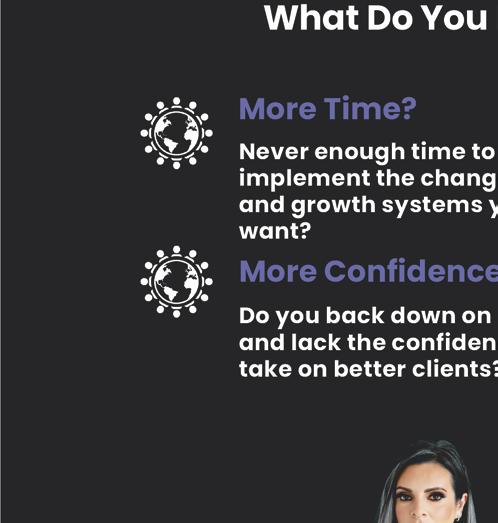


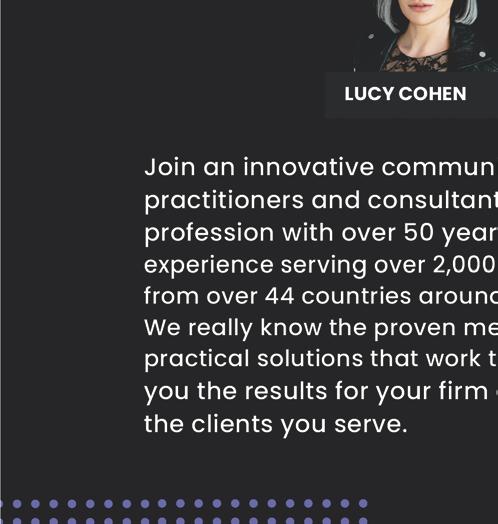
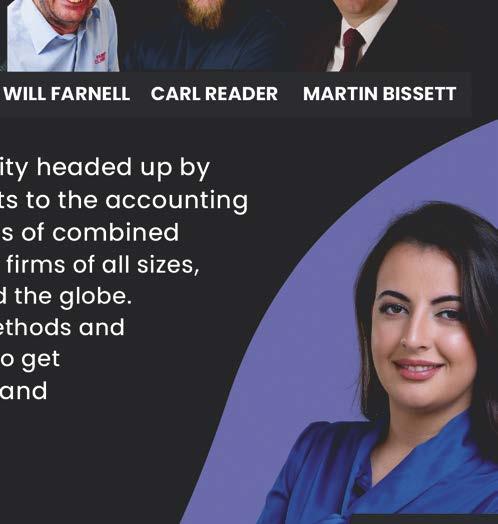

UPCOMINGWEBINARS
FEATUREDEVENT
Future-Proof Your Practice with Carbon Accounting
Date: 26 October 2023
Time: 10.00 – 11.00
Venue: Online webinar
Speaker: Joanna Auburn
Joanna Auburn, Founder and CPO at Trace, has spent her career across sustainability and product. She has a first class Masters in Civil and Structural Engineering and began her career in the UK’s first retail energy provider. She has 10 years’ experience in product development building and scaling products globally. At Trace, Jo leads product development and UK go -to-market.
Speaker: Taylor Fox-Smith
Taylor Fox-Smith is an experienced commercial leader and a fierce advocate for the role of accountants in a cleaner future. With her legal background and


OTHEREVENTS
Electric cars: the role of tax in driving change
Date: 7 December
Time: 10.30 – 11.30
Speaker: Emma Rawson
Venue: Online webinar
The popularity of electric cars continues to rise. In April this year, 15.4% of all new car registrations were electric vehicles. Whilst fuel costs are undoubtedly a driver in the decision to go green, the tax benefits can also be persuasive.
In this webinar, we’ll look at the tax implications of providing an electric company car or using an electric car for business purposes, and why businesses might want to make the switch.
This webinar is aimed at tax advisers, business owners and employers who provide company cars. It is pitched at an intermediate
experience developing standards, Taylor sees accountants as the trusted advisor who can power emissions measurement at scale. Taylor’s area of expertise includes climate-related disclosure, carbon accounting software, sustainability reporting and climate risk management for SMEs.
In partnership with AIA, Trace is helping accountants to understand the emerging demands of carbon reporting from their SME clients. Setting and reaching net zero targets starts with carbon accounting and we have the tools to power you and your firm with this service. In our session, we will cover:
● the role of accountants in reaching net zero targets;
● how to measure the carbon footprint of your accounting firm;
● how to measure the carbon footprint of your SME clients;
● why carbon is a business risk for your SME clients and how you
level, and will assume some knowledge of both the basic income tax and corporation tax rules for businesses and employment taxes. Topics covered will include:
● business deductions and capital allowances on electric cars;
● the benefit in kind rules for electric company cars;
● tax implications of charging electric cars at work, at home and on the go;
● VAT issues relating to electric cars;
● tax treatment of other kinds of vehicle (including hybrid cars and electric vans);
● upcoming VED changes; and
● what the future might hold for tax and electric cars.
By attending this session, you will learn about the various tax benefits to businesses of switching
can help them manage it; and
● the role of carbon accounting software in helping your firm to secure the revenue, client retention and employee engagement benefits of net zero.
Takeaways:
● Every SME will soon be required by their clients to report on their carbon emissions and plans to decarbonise.
● Trace is a simple platform to help your clients measure and manage emissions.
● Engaging employees in your sustainability plans will enhance your employer brand and is essential to achieve net zero.
● Top initiatives that every SME should be planning to reduce their emissions.
To reserve your place at this exclusive event go to: www.aiaworldwide.com/cpd/events/ future-proof-your-practice-withcarbon-accounting/
to electric cars, and be able to help you and your clients decide on the best option. Specific learning outcomes from this session include an understanding of:
● the wide range of tax implications (both direct and indirect) of using electric cars for business purposes;
● the tax deductions available to businesses using electric cars;
● the tax consequences of providing electric company cars to employees;
● how the different ways you can reimburse employees for electric car business usage can have different tax consequences;
● the pros and cons from tax perspective of using pure electric vs hybrid vehicles; and
● the different tax implications of leasing vs purchasing an electric car for your business.
28 ISSUE131 | AIAWORLDWIDE.COM
EVENTS
IFAC calls on G20 leaders to lead on sustainable and inclusive growth, and highlights the enabling role of accountancy profession
InSeptember2023,theUnited Nationsmarkedthehalf-waypoint tothedeadlinesetforachievingthe 2030AgendaandtheSustainable DevelopmentGoals.Thisisan importantjunctureforgloballeaders toreflectontheprogresswehave made,theprogresswehavenotmade, andthechallengeswefaceahead.
ReflectingontheG20’scurrent themeof‘Oneearth,onefamily, oneFuture’,theInternational FederationofAccountantshighlights theimportanceofinclusivity inunderpinningsustainable developmentinits2023CalltoAction (seetinyurl.com/2j74rzrm).Itstates thatwemustapproachsustainability, thepublicsector,SMEsandeducation withaninclusiveapproachtomake surethattheopportunitiesoftoday andtomorrowareshared,andthat economicandsocialdevelopmentare trulysustainable.
‘Wehaveseriouschallenges aheadofus.Fortunately,the
INTERNATIONAL
IASBsetsoutaccounting requirementsforwhenacurrency isnotexchangeable
The International Accounting Standards Board (IASB) has issued amendments to IAS 21 The Effects of Changes in Foreign Exchange Rates that will require companies to provide more useful information in their financial statements when a currency cannot be exchanged into another currency.
The amendments respond to stakeholder feedback and concerns about diversity in practice in accounting for a lack of exchangeability between currencies. The amendments will help companies and investors by addressing a matter not previously covered in the accounting requirements for the effects
globalaccountancyprofessionisa committedpartner,doingourpartto drivesustainabledevelopmentand demonstratingleadershipasatruly globalandinclusiveprofession,’said IFACCEOKevinDancey.
IFACcallsonG20leadersto:
● Make sustainability a reality, not just a goal
● LeadonachievingtheUNSDGsand provideafoundationfornetzero transitions
● SupporttheISSB’sglobalbaseline forsustainabilitydisclosures
● Supportmandatoryassuranceof sustainabilityinformationpursuant toISSA5000
● Supporttheworkofthe InternationalPublicSector AccountingStandardsBoardto developsustainabilityreporting standardsforthepublicsector
Supportpublicfinancialmanagement andfightcorruption
● Supporthigh-qualitypublic
of changes in foreign exchange rates.
These amendments will require companies to apply a consistent approach in assessing whether a currency can be exchanged into another currency and, when it cannot, in determining the exchange rate to use and the disclosures to provide.
Linda Mezon-Hutter, Vice-Chair of the IASB, said: ‘These amendments fill a gap in our accounting standards. Diverse views on assessing whether a currency can be exchanged into another currency, and the exchange rate to use when it cannot, could lead to material differences in companies’ financial statements. The amendments will improve the usefulness of information provided to investors.’
The amendments will become effective for annual reporting periods beginning on or after 1 January 2025. Early application is permitted.
financialmanagement, professionalisationinthepublic sectorandaccrualaccountingatall levelsofgovernment
● Continuetoprioritisefulladoption andimplementationofglobal commitmentsonthefightagainst corruption,suchastheG20AntiCorruptionActionPlan
CreateanenvironmentforSME growthandinnovation
● EmbedtheuniqueneedsofSMEs intoglobalpolicymaking
● Supportaccesstodigital infrastructureandskillsforSMEs
● Provideasupportiveregulatory environmentforSMEs
Noinclusivegrowthwithouteducation
● Supportequalaccesstoeducation, includingSTEM(science, technology,engineeringandmath) andaccountingskills
● Supportfinancialliteracyglobally andlocally
IASBproposesannual improvementstoIFRSAccounting Standards
The International Accounting Standards Board has published proposed narrowscope amendments to IFRS Accounting Standards and accompanying guidance as part of its periodic maintenance of the Accounting Standards.
As explained in the IFRS Foundation’s Due Process Handbook, annual improvements are limited to changes that either clarify the wording in an IFRS Accounting Standard, or correct relatively minor unintended consequences, oversights or conflicts between requirements of the Accounting Standards. The proposed improvements are packaged together in one document.
The proposed amendments include clarifications, simplifications,
29 AIAWORLDWIDE.COM | ISSUE131 TECHNICAL INTERNATIONAL
TECHNICAL
corrections or changes to improve consistency in IFRS 1 First-time Adoption of International Financial Reporting Standards; IFRS 7 Financial Instruments: Disclosures and its accompanying Guidance on implementing IFRS 7; IFRS 9 Financial Instruments; IFRS 10 Consolidated Financial Statements; and IAS 7 Statement of Cash Flows.
The comment deadline is 11 December 2023.
UKANDIRELAND
FRCconsultsonrevisionstothe EthicalStandardforauditors
The Financial Reporting Council (FRC) has issued a consultation on revisions to the FRC’s Ethical Standard to further enhance and clarify the principles of integrity, objectivity and independence auditors must abide by.
In the FRC’s 2022 position paper on audit market reform, the FRC committed to revising the Ethical Standard, and to consult at the same time about the withdrawal of the Other Entities of Public Interest (OEPI) category introduced in 2019. This is in light of the government’s proposed changes to the statutory Public Interest Entity (PIE) definition.
The proposed revisions to the Ethical Standard enhance prohibitions where an audit firm’s independence could be threatened by an economic over reliance on fees from specific entities that are connected. Other changes to prohibitions reflect relevant findings from audit inspections and enforcement cases.
Additional changes reflect significant developments in the International Ethics Standards Board for Accountants (IESBA) Code since the FRC last revised the Ethical Standard in 2019. These ensure that the UK’s Ethical Standard is no less stringent than the international code.
The new standard has also been revised to ensure breaches of ethical standards are reported to the FRC on a more timely basis.
The FRC’s Executive Director of Regulatory Standards, Mark
Babington said: ‘High standards of ethical behaviour go to the heart of high-quality audit and are designed to ensure auditors act with independence, objectivity and integrity at all times. While many of these proposed changes reflect developments at the international level, additional enhancements have also been introduced to ensure the ethical requirements are clearly understood and abided by so that there can be no uncertainty of the standards expected.’
The consultation closes on 31 October 2023.
IAASApublishesguidelinesfor RecognisedAccountancyBodies
The Irish Auditing and Accounting Supervisory Authority has published guidelines for the Recognised Accountancy Bodies to apply to their approval and registration function in respect of statutory auditors and accountancy firms.
The guidelines will support the achievement of the following outcomes and meet the requirements of the Companies Act 2014:
● Only individuals who meet eligibility criteria and are of good repute are approved to perform statutory audit.
● Only firms that meet eligibility criteria and are of good repute are approved as statutory audit firms.
● All statutory auditors and audit firms meet the requirements for approval on an ongoing basis.
● The public register is accurate, contains all information required by law and is updated promptly for any changes.
These guidelines are not intended to replace or override any legislative provisions. They should be read in conjunction with the Companies Act 2014 (the Act), Regulation (EU) No 537/2014 and any section 931 notice, rule or other guideline that IAASA may issue.
Nothing in these guidelines may be construed so as to constrain IAASA from taking action, where it deems it to be appropriate, in respect of a Recognised Accountancy Body’s organisation of its approval and
registration function.
The guidelines are effective from 1 June 2024 and are available at: tinyurl.com/4s4zpawe
FRCwelcomesrecordnumberof StewardshipCodesignatories
The Financial Reporting Council (FRC) has announced a record number of successful signatories to the UK Stewardship Code following the latest round of applications. There are now 277 signatories to the Code, representing £44.6 trillion assets under management. This includes 189 asset managers, 69 asset owners and 19 service providers. 27 organisations have been added to the signatory list, and 164 organisations successfully renewed their signatory status following the Spring 2023 application window.
The strength of the principlesbased and flexible nature of the Code is evidenced by growth of the signatory list to date, which includes a wide range of organisations by size, asset class and strategy. The FRC is pleased to see continued growth in the assets other than listed equity covered by the Code, and continued progress in the reporting of stewardship activities and outcomes by signatories; for example, in improving the board diversity at investee companies and improved disclosure related to climate change and biodiversity.
EUROPE
EuropeanCommission,EFRAG andISSBconfirmhighdegreeof climate-disclosurealignment
The European Commission has issued the European Sustainability Reporting Standards (ESRS) which come into effect in 2024. To coincide with the publication, the European Commission, the European Financial Reporting Advisory Group (EFRAG) and the International Sustainability Standards Board (ISSB) are providing an update on their discussions around alignment
30 ISSUE131 | AIAWORLDWIDE.COM
and interoperability between ESRS and the ISSB Standards.
The European Commission, EFRAG and the ISSB have worked jointly to improve the interoperability of their respective climate-related disclosure requirements in the overlapping climate disclosure standards. This work has successfully led to a very high degree of alignment, reduced complexity and duplication for entities wishing to apply both the ISSB Standards and ESRS.
ESRS and ISSB Standards have been developed within their respective mandates, with some differences on impact materiality beyond an investor’s perspective and coverage of the range of ESG matters in separate standards. However, the work undertaken on interoperability enables an entity to efficiently apply both sets of climaterelated standards with minimised duplication of effort.
To assist entities who will apply both ESRS and the ISSB Standards, the European Commission together with EFRAG and the ISSB will work on interoperability guidance material that could assist entities in navigating between the standards and to understand where there are incremental disclosures required by only one set of standards.
The European Commission together with EFRAG and the ISSB will continue to work jointly to optimise the interoperability of their respective standards. In addition to the publication of guidance material to assist entities to navigate between the standards, the joint work will focus on the digital tagging of disclosures as a means of further facilitating interoperability.
Emmanuel Faber, ISSB Chair said: ‘I congratulate my European colleagues on the publication of the European Sustainability Reporting Standards. Furthermore, I thank them for the positive collaboration to achieve the very high degree of alignment between climate requirements in the ISSB Standards and ESRS.
‘Much progress has been achieved. We have substantially advanced the reduction of the duplicative disclosure burden, reflecting our respective mandates. Those applying ISSB Standards as well as ESRS will be able to use our navigation tool.’
Supervisoryco-operationinthe fightagainstfinancialcrimeis improving,theEBAfinds
The European Banking Authority (EBA) has published its third Report on the functioning of anti-money laundering and countering the financing of terrorism (AML/CFT) colleges. The report finds that competent authorities had taken important steps to improve the functioning of AML/CFT colleges. Nevertheless, many colleges had not reached full maturity.
The Report highlights good practices that will be useful for competent authorities to further improve the effectiveness of AML/CFT colleges and of supervisory outcomes. AML/CFT colleges are permanent structures that serve to enhance co-operation between different supervisors involved in the supervision of cross-border institutions. As of 31 December 2022, competent authorities had reported 229 fully operating colleges to the EBA. An additional 54 colleges had yet to hold their first meeting.
The report sets out findings and observations from the monitoring of AML/CFT colleges in 2022 done by EBA staff. This suggests that college members had taken important steps to improve the effectiveness of AML/CFT colleges. More specifically, members were approaching the organisation of AML/CFT colleges in a more structured manner, which contributed to the exchange of more substantive and actionable information than was the case in the previous years.
Prudential supervisors and financial intelligence units (FIUs) participated in a greater number of colleges. As a result, supervisors had access to more relevant information that could timely inform their approach to the supervision of institutions operating on a cross-border basis. In some colleges, members had taken steps to identify common issues and address these issues in a coordinated manner.
Despite these notable achievements, AML/CFT colleges had not yet reached full maturity. Competent authorities reported that approximately 50 colleges had not yet held their first meeting. In some colleges, the sharing
of relevant information remained insufficient. Lastly, the onboarding of third country authorities was still a challenge and only a few of them could participate in college meetings.
The report highlights good practices that could be useful for competent authorities to overcome these challenges and further improve the effectiveness of AML/CFT colleges going forward.
UNITEDSTATES
FASBissuesstandardthat improvesaccountingforjoint ventureformations
The Financial Accounting Standards Board (FASB) has issued an Accounting Standards Update (ASU) intended to: provide investors and other allocators of capital with more decision-useful information in a joint venture’s separate financial statements; and reduce diversity in practice in this area of financial reporting.
The ASU applies to the formation of entities that meet the definition of a joint venture (or a corporate joint venture) as defined in the FASB Accounting Standards Codification Master Glossary. While joint ventures are defined in the Master Glossary, there has been no specific guidance in the Codification that applies to the formation accounting by a joint venture in its separate financial statements, specifically the joint venture’s recognition and initial measurement of net assets, including businesses contributed to it. Stakeholders noted that the lack of guidance has resulted in diversity in practice in how contributions to a joint venture upon formation are accounted for by the joint venture.
The amendments in the ASU provide decision-useful information to a joint venture’s investors and reduce diversity in practice by requiring that a joint venture apply a new basis of accounting upon formation. As a result, a newly formed joint venture, upon formation, would initially measure its assets and liabilities at fair value (with exceptions to fair value measurement
31 AIAWORLDWIDE.COM | ISSUE131 TECHNICAL
TECHNICAL
that are consistent with the business combinations guidance).
The amendments in this ASU are effective prospectively for all joint ventures with a formation date on or after 1 January 2025, and early adoption is permitted. Additionally, a joint venture that was formed before the effective date of the ASU may elect to apply the amendments retrospectively if it has sufficient information.
The ASU is available at www.fasb.org
FASBseekspubliccommentona proposaltoimprovedisclosures aroundincomestatement expenses
The Financial Accounting Standards Board has published a proposed Accounting Standards Update (ASU) intended to provide investors with more decision-useful information about a public business entity’s expenses. Stakeholders are encouraged to review and provide comment on the proposal by 30 October 2023.
‘Feedback from investors on our 2021 Agenda Consultation provided us with a fresh approach to providing more detailed information about a company’s expenses, which investors have said is critically important to understanding a company’s performance, assessing its prospects for future cash flows, and comparing its performance over time and with that of other companies,’ stated FASB Chair Rich Jones. ‘As a result, less than 18 months after revising the scope of the project, we’ve issued this proposed standard that would require companies to provide more information about specific expenses in the notes to financial statements.’
The proposed ASU would require public companies to provide detailed disclosure of specified categories underlying certain expense captions in interim and annual periods. It would provide investors with more detailed information about the types of expenses, including employee compensation, depreciation, amortisation and costs incurred related to inventory and manufacturing activities in income statement expense
captions, such as: cost of sales; selling, general and administrative; and research and development.
The amendments in the proposed ASU do not change or remove existing expense disclosure requirements and do not change requirements for presentation of expenses on the face of the income statement. They would require public companies to include certain existing disclosures in the same tabular format disclosure as the other disaggregation requirements set forth in the proposed ASU.
The FASB will host a public roundtable on 13 December 2023, to obtain additional feedback on the proposed ASU. Those interested in participating in the roundtable should submit a comment letter and register for consideration. Roundtable participants will be selected to ensure a balance of perspectives from investors, preparers, auditors and other stakeholders. Details about the roundtable, including registration information for both participants and observers, will be announced on the FASB website.
ASIAPACIFIC
RegionalPaymentConnectivity expansiontoincludetheState BankofVietnam
State Bank of Vietnam (SBV), the central bank of Vietnam, has officially joined the Regional Payment Connectivity (RPC) initiative. This recent development is an expansion of the Memorandum of Understanding on Co-operation in Regional Payment Connectivity (MOU RPC) that was initiated by the central banks of Indonesia, Malaysia, Philippines, Singapore and Thailand at the sidelines of the G20 Leaders’ Summit on 14 November 2022 in Bali.
At the sidelines of the 10th ASEAN Finance Ministers’ and Central Bank Governors’ Meeting (AFMGM) on 25 August 2023 in Jakarta, Indonesia, SBV signed the Supplemental Pages of the MOU RPC. It was witnessed by existing RPC participants, namely Bank Indonesia, Bank Negara Malaysia,
Bangko Sentral ng Pilipinas, Monetary Authority of Singapore and Bank of Thailand. The expansion of the RPC to include other ASEAN members is a mandate from the 9th AFMGM. Further, it is a priority of the ASEAN 2023 Indonesia Chairmanship.
The RPC initiative was established to strengthen and enhance collaboration on payment connectivity through the development of faster, cheaper, more transparent and more inclusive cross-border payments. The cooperation encompasses several modalities, including QR-code and fastpayment based cross-border payments. The goal of the RPC is to make intercountry payments more seamless, convenient and affordable, allowing individuals and businesses to conduct transactions across the ASEAN region with ease.
The inclusion of SBV has increased the RPC group from five to six ASEAN central banks. This partnership aims to further support post-pandemic economic activities across the ASEAN region, including the promotion of tourism and other service industries. The expansion is also expected to benefit small and medium-sized enterprises, which are crucial to the region’s economic growth. By connecting their payment systems, ASEAN member states can increase trade and remittances within the region. These are expected to widen financial inclusion and significantly contribute to the overall advancement of the ASEAN economic community. Going forward, the RPC can also be expanded to neighbouring economies and other countries beyond ASEAN.
Deputy Governor Pham Thanh Ha, who represented SBV at the signing ceremony, stated: ‘SBV is pleased to be a new signatory of the MOU on Cooperation in Regional Payment Connectivity and looks forward to the close coordination among all the parties to promote faster, cheaper, more transparent and more inclusive crossborder payments. The MOU shows our solidarity and marks a good starting point for cooperation to strengthen regional economic integration and advance payment connectivity toward making ASEAN a global leader in payments connectivity.’
32 ISSUE131 | AIAWORLDWIDE.COM





















This advertisement is produced and presented by HMCA/S PLC (trading as Hospital Medical Care Association, HMCA and HMCA Members) which is authorised and regulated by the Financial Conduct Authority (FRN:307587). HMCA/S PLC is a company registered in England, company number: 01362094, registered o ce: Beech Hall, Knaresborough, North Yorkshire, HG5 0EA. s98v2©2023. 280350. Rated ‘Excellent’ by our customers on Call today for a no obligation quote on or enquire online at www.hmca.co.uk/aia 01423 799949 OVER 45 YEARS PROVIDING SERVICES TO MEMBERSHIP GROUPS Private Medical Cover Your choice of hospital & specialist NHS queues avoided No age limit Tax free NHS cash benefit Claims settled promptly Making a claim will not a ect your subscription Excellent UK based service Transfer & Save or Start Today *Based on data provided by members who joined HMCA between 1st May 2022 and 30th April 2023. †Exclusive o er available to selected membership groups. for members of EXCLUSIVE OFFER† Association of International Accountants 92% SAVED MONEY transferring to HMCA*
THE AIA EDUCATIONAL & BENEVOLENT TRUST
MAKING A DIFFERENCE
The AIA Educational & Benevolent Trust provides life-changing support for learners seeking to study for the AIA Professional Qualification. Apply for assistance now or make a donation to support fellow members like you.

Scan the code or visit our website to find out more: www.aiaworldwide.com/about-us/charities-and-support MAKE A DONATION OR APPLY FOR ASSISTANCE TODAY








































































